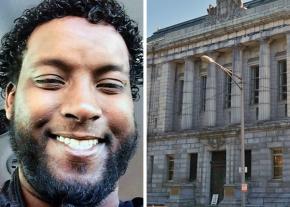ICE grabs another victim in Maine
reports from Portland, Maine, on another story of ICE on the rampage.
THE PLIGHT of Abdi Ali reads like something straight out of Franz Kafka's The Trial, the famous novel about faceless authority and unaccountable repression.
Ali, a 28-year-old Somali immigrant, was abruptly arrested by Immigration and Customs Enforcement (ICE) agents on April 6, during a court hearing at the Cumberland County Superior Court in Portland, Maine.
Ali was being arraigned on an OUI (operating while under the influence) charge, to which he pleaded not guilty, when three ICE agents burst into the courtroom and "grabbed him, pushed him against the wall and roughly handcuffed him before walking him out of the court," according to the report of the Bangor Daily News.
The incident left Ali's lawyer, Tina Heather Nadeau, who was advising him on the drunk-driving charge, dumbstruck--and more than a little unnerved. She told the Bangor Daily News that she has "never seen this in Maine" before. "It is very disturbing that someone coming to the courthouse for his scheduled court date and to get legal counsel is being dragged out in handcuffs," Nadeau said.

Ali is currently being held in the Cumberland County Jail. He lives in Westbrook with his fiancée, Melissa Hair, and her three children.
Further contributing to the absurdity of Ali's ordeal is the fact that he isn't undocumented. Ali is a permanent resident of the U.S. and has lived in Portland for 20 years. His family fled war-torn Somalia in 1996, when he was only 7 years old.
While Ali and Hair acknowledge his troubled past and several felony convictions, the Daily News account of his arrest notes that he has "straightened out his life" in recent years, holding down a steady job and becoming close with Hair's children.
A spokesman for ICE maintains that Ali "resisted arrest, both verbally and physically," but Nadeau denies this.
ICE IS typically prohibited from arresting people in "sensitive locations," including schools, hospitals, places of worship and courthouses. But as Lucian Villasenor pointed out last month at SocialistWorker.org, Donald Trump's escalated crackdown on immigrants, undocumented or otherwise, has granted ICE agents significantly expanded authority in who they round up and how.
Though ICE has claimed in the past to limit its focus to criminals, under the Trump administration, the agency has been given free rein to cast as a wide net, targeting individuals convicted of misdemeanors or other petty crimes.
In some cases, the individuals ICE rounds up have not actually been charged with a crime--since agents are now empowered under a Trump executive order to detain and deport people they deem to be a "risk to public safety or national security," regardless of whether they have been formally accused of any crime.
At a rally for Portland's immigrant community, Carlos, the Maine coordinator for the immigrant rights group Cosecha, said: "We're living in a very dangerous moment right now. ICE's abduction [of Ali] is not an isolated incident. The immigrant community is in a lot of danger, right now."
The newly formed Maine branch of Cosecha is the newest chapter of the nationwide immigrant advocacy group. Cosecha is calling for a national immigrant strike to coincide with May Day.
Ali's arrest confirms the suspicions of activists here that ICE is maintaining an active presence in Maine. The incident comes on the heels of a similar ICE raid in Vermont last month, where agents arrested three prominent immigrant labor activists. As Steve Ramey made clear in a SocialistWorker.org article on the case, the activists' arrest seemed to have more to do with their involvement in labor organizing than their immigration status.
The message Trump is sending to immigrant communities throughout the country is obvious: "Securing our borders" means keeping them free for capital to exploit workers and reap massive profits. It has nothing to do with deporting dangerous criminals.
Ali is grief-stricken at the thought of being deported back to Somalia, which is currently enduring deadly violence from the conflict between the government and the Islamist militant group al-Shabaab. Severe famine and drought have also left much of the country at risk of starvation, according to the United Nations.
While Carlos acknowledged the fear many immigrants have of speaking out or joining protests of ICE raids, he nonetheless insists that only an organized and determined left can bring safety and dignity to the nation's 11 million undocumented workers.
"I believe that because you're scared, it should give you more power to fight back," he said. "The fact is you need me. You need my labor and services. And I think somebody needs to have the courage to step forward and almost make a sacrifice for the community."


